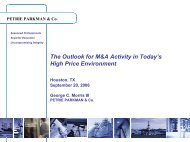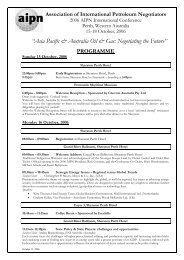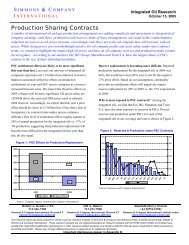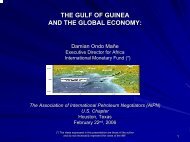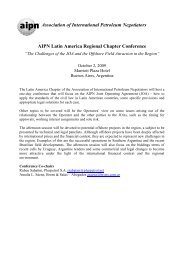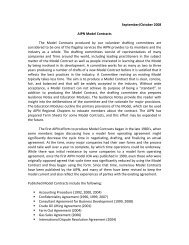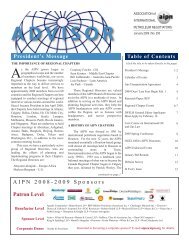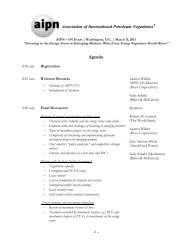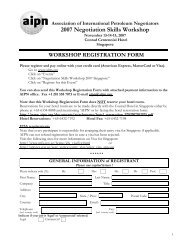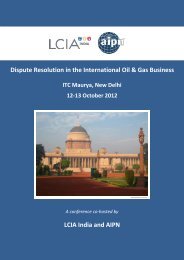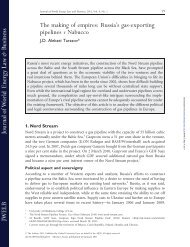ADVISOR - AIPN
ADVISOR - AIPN
ADVISOR - AIPN
Create successful ePaper yourself
Turn your PDF publications into a flip-book with our unique Google optimized e-Paper software.
EDUCATION<br />
Moving towards an African Lex Petrolea<br />
A recent initiative from the African Petroleum Producers<br />
Association (APPA) to carry out a comparative analysis of the<br />
hydrocarbons legislation, regulations and model agreements in the<br />
APPA Member States is a unique initiative that has never been<br />
completed on such a large scale before. Importantly, the initiative<br />
will make a significant contribution to the development of Lex<br />
Petrolea in Africa.<br />
The African Petroleum Producers Association<br />
The APPA is an African organisation similar to the Organisation of<br />
the Petroleum Exporting Countries (OPEC), although on a smaller<br />
scale since Africa only encompasses 8 per cent of worldwide oil<br />
and natural gas reserves, and 12 per cent and 8 per cent of<br />
worldwide daily production of oil and natural gas respectively.<br />
The APPA was initially created by Algeria, Angola, Benin,<br />
Cameroon, Gabon, Libya and Nigeria in Lagos, Nigeria in 1987. The<br />
APPA is currently comprised of 18 Member States 1 with the recent<br />
addition of Ghana and Niger. Member States are mainly located in<br />
North, West and Central Africa. No frontier East African country is<br />
a member yet.<br />
The APPA is intended to develop as a common platform for oil<br />
and gas policy initiatives and development strategy and is mainly<br />
aimed at enabling Member States to derive equitable revenues<br />
from the management of hydrocarbons resources in Africa. To this<br />
end, the APPA has commissioned a significant number of<br />
referential studies and has created an APPA Petroleum Institute,<br />
an APPA Fund for Technical Cooperation and an APPA Data Bank.<br />
The background of the comparative analysis<br />
The APPA has rightly recognised the growing interest in<br />
hydrocarbons resources in Africa both in mature and frontier areas,<br />
but has also acknowledged the worldwide quest to develop<br />
hydrocarbons resources and the ensuing competition between<br />
countries for investment.<br />
The APPA has therefore understood the importance of a<br />
properly designed petroleum regime to ensure the allocation of<br />
maximum revenues to the Member States and at the same time<br />
to remain attractive for international oil companies investing all<br />
over the world. A properly designed petroleum regime will not<br />
trigger investment, which is mainly based on the attractiveness of<br />
By Nicolas Bonnefoy, Partner, Ashurst LLP London<br />
nicolas.bonnefoy@ashurst.com<br />
the geology, but an ill-designed petroleum regime will certainly<br />
deter international oil companies from investing in spite of an<br />
attractive geology.<br />
The comparative analysis<br />
In this context, the APPA 7th programme of action for 2008-2011<br />
included the performance of a comparative analysis of the<br />
hydrocarbons legislation, regulations and model agreements in<br />
force in the 16 APPA Member States. Based on the terms of<br />
reference, the comparative analysis was intended to allow the<br />
APPA Member States to review and adjust the legislation,<br />
regulations and model agreements applicable to the exploration<br />
for and exploitation of hydrocarbons in their respective countries<br />
in order strengthen their control over hydrocarbons resources,<br />
maximise proceeds derived from the exploitation of hydrocarbons<br />
resources and ensure compliance with environmental legislation.<br />
The engagement also included the determination of a set of<br />
principles, practices and trends applicable to the hydrocarbons<br />
industry in Africa to be incorporated into a model production<br />
sharing agreement.<br />
The engagement was awarded to a consortium of<br />
international law firms 2 and consultants 3 on 23 March 2010 further<br />
to a competitive bidding process, although the engagement<br />
officially started in July 2010. The initial steps included a significant<br />
information gathering process to collect the various pieces of<br />
legislation, regulations and model agreements in force in the 16<br />
APPA Member States. An initial meeting finally took place in<br />
Brazzaville in December 2010. The comparative analysis, the<br />
principles, practices and trends applicable to the hydrocarbons<br />
industry in Africa and the model production sharing agreement<br />
were progressively incorporated into a report and discussed with<br />
the APPA in three phases: a preliminary report was discussed<br />
during a technical meeting in Brazzaville in June 2011, an updated<br />
report was presented in Malabo in February 2012 and the final<br />
report was completed both in French and English in July 2012.<br />
As mentioned above, this comparative analysis and the<br />
preparation of a model production sharing agreement is truly a<br />
unique initiative that has never before been undertaken and<br />
successfully completed on such a large scale. Even the Association<br />
of International Petroleum Negotiators, which had been the first<br />
organisation to undertake a similar initiative, could not agree on a<br />
model production sharing agreement.<br />
1 Algeria, Angola, Benin, Cameroon, Chad, Democratic Republic of Congo, Congo, Côte d’Ivoire, Egypt, Gabon, Ghana, Equatorial Guinea, South Africa, Libya, Mauritania, Niger,<br />
Nigeria and Sudan.<br />
2 Gide Loyrette Nouel (where I was working at the time of this engagement) and Macleod Dixon (now Norton Rose).<br />
3 Van Meurs Corporation and the Centre for Energy Petroleum and Mineral Law & Policy (Dundee University).<br />
SEPTEMBER 2012 • 24



